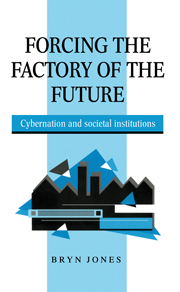Book contents
- Frontmatter
- Contents
- List of figures
- List of tables
- Acknowledgements
- List of acronyms and abbreviations
- Part I The workshop versus the factory
- 1 Introduction: explaining factory evolution
- 2 Past production paradigms: the workshop, Taylorism and Fordism
- 3 Productivity for prosperity: industrial renewal and Cold War politics
- Part II Technologies of control
- Part III Cybernation and flexibility
- Appendix: sources and methods
- Notes
- Bibliography
- Index
2 - Past production paradigms: the workshop, Taylorism and Fordism
from Part I - The workshop versus the factory
Published online by Cambridge University Press: 06 July 2010
- Frontmatter
- Contents
- List of figures
- List of tables
- Acknowledgements
- List of acronyms and abbreviations
- Part I The workshop versus the factory
- 1 Introduction: explaining factory evolution
- 2 Past production paradigms: the workshop, Taylorism and Fordism
- 3 Productivity for prosperity: industrial renewal and Cold War politics
- Part II Technologies of control
- Part III Cybernation and flexibility
- Appendix: sources and methods
- Notes
- Bibliography
- Index
Summary
Modern Industry had therefore itself to take in hand the machine, its characteristic instrument of production, and to construct machines by machines.
Karl Marx, Capital, vol. I, p. 384Introduction
Beneath forecasts of the revolutionary cybernation of factories are assumptions of historical precedents. Notably, that manufacturing evolution proceeds through systematic transformations: the mechanisation of the Industrial Revolution, Taylorism/Scientific Management, Fordism. An initial problem in assessing the validity of such characterisations is deciding what qualities define the dominance of one system of production rather than another. Unfortunately, the obvious criteria such as the preponderance of different production techniques, occupations, machines or organisational structures are unreliable guides. A contrast in early nineteenth-century Britain between the numbers of self-acting mules and the numbers of spinning-jennies points, unequivocally, to the rise of the factory system in cotton. Yet, in many other cases the distinction is less simple.
British firms were producing motor cars in ‘mass’ volumes by the 1930s; seemingly imitating the ‘Fordist’ system that had taken over the US auto industry by the 1920s. However, the detailed technology and practices of the British firms were qualitatively different from the American industry, until at least the 1950s (Lewchuck 1986, p. 150). In these and other instances comprehensive change needed shifts in the mental framework of the relevant decision makers in the industry. The machines, techniques and tasks gell into a distinctively new set of production practices only when employers, managers and engineers act on a coherent new outlook – a paradigm – of how, and for what purposes, production is to be organised.
- Type
- Chapter
- Information
- Forcing the Factory of the FutureCybernation and Societal Institutions, pp. 23 - 50Publisher: Cambridge University PressPrint publication year: 1997
- 2
- Cited by



